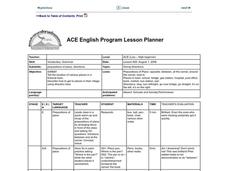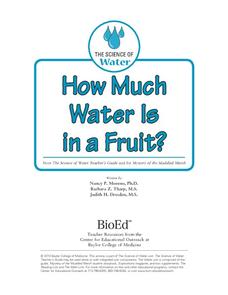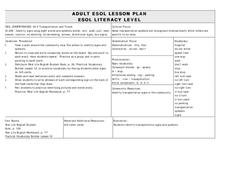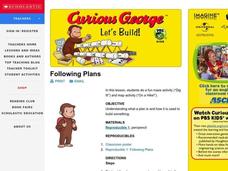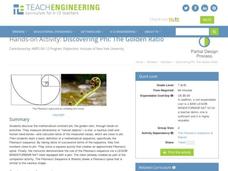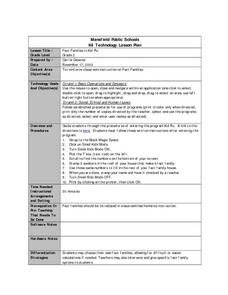Curated OER
North, South, East, and West
A basic lesson on the teaching of the cardinal directions awaits your class. They are directed to go to different parts of the playground and where they attempt to describe their location in relation to each other by using the cardinal...
Curated OER
How Well Do You Follow Directions?
Learners complete an activity by following directions. They discuss the results of the activity and take a quiz. They repeat this lesson once a month.
Curated OER
Giving Directions
Students explore communication by participating in language description activities. In this directions instructional activity, students practice using communicative terms and prepositions of places to direct a classmate to an exact...
Perkins School for the Blind
Beginning Map Skills
Maps can be so much fun, they help you understand spatial relationships, distance between objects, and can foster direction skills. Budding cartographers with visual impairments use the Wheatley Tactile Diagramming Kit to create their...
Colorado State University
Why Do Hurricanes Go Counterclockwise in the Northern Hemisphere?
Test your class' coordination as they model the Coriolis Effect. Forming a large circle, learners move to the right as they try to toss a ball to the person across from them. The movement of the circle represents the rotation of the...
Baylor College
How Much Water Is in a Fruit?
Compare the volume of an orange to the volume of liquid that can be extracted out of it. Also compare the mass of an apple before and after it has been dried out. In both of these activities, children find that there is an appreciable...
Curated OER
Going Places
First graders study directional words such as North, South, East, West, up and down.
Curated OER
Springtime Flower Fun
Learners study directional skills and participate in a scavenger hunt to find flowers. They compare, group and classify the flowers by their similarities and differences.
Curated OER
WRITE? NO WAY!
Young scholars discover the right brain-left brain differences and then think about how to break down some of their self-criticism to try writing.
Curated OER
Magic Ball
Using the magic ball, students identify the different directions. They follow the movements of the teacher with the magic ball.
Curated OER
Does Santa Claus use the Coriolis Force to Travel East?
Students are given a visual demonstration of the Coriolis Force in the Northern Hemisphere. They are encouraged to find locations around the globe and try to predict what the weather circulation patterns might be like.
02 x 02 Worksheets
Inverse Variation
Discover an inverse variation pattern. A simple lesson plan design allows learners to explore a nonlinear pattern. Scholars analyze a distance, speed, and time relationship through tables and graphs. Eventually, they write an equation to...
Curated OER
The Disappearing Kelp Forest
Learners observe the effect "El Nino" left on kelp plants and sea urchins. They analyze the data collected by researchers, by graphing it on a TI calculator. Before graphing and analyzing the data, you may want to revisit the events of...
Curated OER
Children's Rights/Child Labor -- A Photographic Essay
Students continue to examine the conditions students work in throughout the world. Using photographs, they discover the similarities and differences in regions throughout the world. They relate their own experiences to the child laborers.
Curated OER
ADULT ESOL LESSON PLAN--Transportation and Travel
Students, while defining an extensive list of vocabulary terms on the board, identify common signs and symbols that they may encounter when traveling or using some form of transportation (enter, exit, push, pull, men,
women, caution, no...
Curated OER
Let's Build
Students observe and discuss a picture of Curious George building a bridge and discuss what it means to build, plan and design a project. As a class, they list things they need to do in oder to build something and explore how a compass...
Teach Engineering
Discovering Phi: The Golden Ratio
Fe, phi, fo, fum. This activity leads pairs to find the ratio of consecutive terms of the Fibonacci sequence. The pairs find that the Fibonacci sequence can be found in many places. A discussion with the class shows that the ratios...
Curated OER
Fact Families in Kid Pix
Second graders study Fact Families in Kid Pix. They use the mouse to open, close and navigate within this application. They assess one click to select, double click to open, drag to highlight, drag and drop, drag to select an area, use...
Curated OER
Which Way to Roots Grow?
Second graders explore roots and how they grow. They observe as seeds planted in various directions grow and record their observations. Students discuss the direction in which the roots are growing.
Curated OER
Highs And Lows
Young scholars experiment to examine high and low pressure areas. They investigate why a high pressure area seeks a low pressure area.
Curated OER
Lub Dub
Students name the vessels and parts of the heart. They trace the path of blood through the heart. Students examine the function of the circulatory system. They recognize the differences between a hear when the body is at rest opposed to...
Curated OER
Boomerangs Keep Coming Back
Students investigate the flight of paper boomerangs. In this flight lesson, students examine the flight variables of paper boomerangs, which they make, by investigating the concepts of lift and drag. They examine what happens when an...
Curated OER
Why Do People Fall in Love?
Students discuss human behavior, sexual selection and the underlying genetic and evolutionary reasons for mate selection. The, in groups, they rate the attractiveness of certain individuals and measure facial features for symmetry.
University of California
Roots of the Cold War
When and how did the Cold War begin? To answer this question, you will not find a better-organized, in-depth, activity- and inquiry-based resource than this! Executing best teaching practices throughout, each portion of this inquiry...


